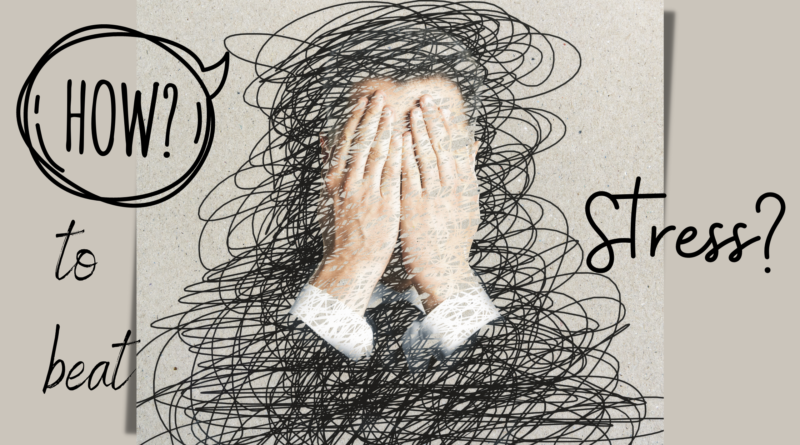How do we beat stress?
It’s interesting how so many people are inviting more stress into their lives day by day. The number of people marked or labeled as stressed is increasing by thousands if not millions every year. Stress, in psychology and biology, (is) any environmental or physical pressure that elicits a response from an organism (www.britannica.com/science/stress-psychology-and-biology).
Scientific definition apart, what is stress in the real, daily life of a common person like you and me? It is the pressure of work, family responsibilities, the debt to repay, the deadlines approaching fast, and what not!! Of course, not all stress is bad. I mean, who would ever complete the work if he didn’t have a deadline to follow? Why would you get hot food exactly as you ordered it in the restaurant if the restaurant didn’t fear losing a patron? Why would the husband take out the trash, for that matter, if he didn’t worry about his wife nagging him about it, like, forever?
Not all stress is good though. Research says stress decreases productivity and increases the chances of early death. At least in today’s world with all the problems being faced by everyone, especially people who want to do something with their lives. It sometimes feels like we should return to being cavemen, living in caves, hunting animals for food, reproducing, and sleeping. The modern world has begun to feel more like a survival game than ever before. And till the time some crazy person invents the time machine, we all have to live in this modern and civilized world where all the things that warrant our attention continuously exceed the resources, especially time. Then what should we do to get out of the rut, so to say? Are we damned to live in continuous stress, attracting more and more slow poisons — I mean diseases that kill slowly — Diabetes, hormonal disbalances, insomnia, cholesterol, hypertension, and what not?
I say no. Don’t believe me? Read on and I’ll tell you what I have been teaching hundreds of people over the past 10 years:
#1 Accept the cause of stress
When we ignore something which is causing stress in our mind, we can’t do anything to eliminate it. Whether it is a terrible boss, a major change in life, a grievance against a loved one, or a long-lasting health issue, we can start to eliminate it only if we acknowledge its existence. Most of the time we tend to ignore and keep trying to convince ourselves that the issue doesn’t exist or is not as important. Many times we displace the focus on other things which are seemingly more important than the stressor. But doing this leads to feelings festering in our minds. This affects the brain and in turn the body. The first thing we need to do to beat stress is to acknowledge that there exists something in our lives that are negatively affecting us. And then comes the second point.
#2 Take Action one step at a time
It is not easy to reach the position of Vice President when you have just started as an intern in a company. But it is easy to get a permanent job where you are working as an intern. It is then easy to show your capability to get a promotion and then another and then yet another till you finally get what you had your eyes set on. It is easier to imagine losing half a pound a week than to imagine losing 26 pounds a year. What I am saying here is, dream big but decide small. One technique which I always recommend is to decide on your BIG goal…… Let’s say, running 2 hours every day. If you are a slacker, sitting at your home and job 16 hours a day, then that is a really big goal for you. After doing half an hour a day you’ll feel like it’s not for you and then you’ll likely quit. Instead, decide to increase your running to 2 hours a day by the end of three months, for example. Then make a reverse timeline. I’ll run 1 hour a day by the end of 6 weeks, you’d say. And half an hour by the end of 3 weeks, and a quarter of an hour by the end of a week. So that gives us a small goal. Start with 5 minutes of walk and 2 minutes of jog. Decrease the walk time by a minute and increase the jog time by 2 minutes every day and you’ll find that you have reached your goal before the decided time. It’s time to pat your back and look forward to the next goal. What happens here is that your mind gets accustomed to your reaching the small goals and then expects you to fulfill the next goal, which, if you noticed, has now turned into a small goal for you. Then the mind and body work together to reach the decided goal. You can apply this for any goal in your life, be it health, career, money, relationships, spirituality, or whatever you want.
#3 Decrease expectations
Expectations from others are a cause of stress for many of us. Although we may not be aware of it, expectations from ourselves are a cause of stress too. If the expectations are not fulfilled they lead to disappointment and sadness. It may be easier said than done, but it is essential to decrease the expectations to the bare minimum level. The principle above can be applied to this as well. Yes, we need to motivate our subordinates to work better, but instead of expecting them to do everything themselves and then getting disappointed when they are unable to, it’s always better to assess their strengths and weaknesses and then guide them accordingly so that they may achieve their goals in a better way. You can even apply the above principle to your employees so that they are not overwhelmed by the goals you are assigning to them. Become a leader and lead by example. The same applies to yourself too. Do a SWOT (Strength, Weakness, Opportunities, Threats – for the uninitiated) analysis on yourself before setting any expectations. Moreover, believe that you have all the resources you will need to complete a task and your mind will guide you to find it.
#4 Set your priorities right
Do you need to win an argument over politics with your friends and risk losing them in the process or can you just agree to disagree over the matter and move on without any grudge? What is important to you? You need to be clear about your priorities. I read somewhere that when your principles are clear your decisions are instant. If you think that the education of your children holds a very high value in your heart then you won’t hesitate before investing or even taking out a loan in your name for the same. Don’t wait till you are faced with a challenge to choose something before you set your priorities. Sit down now and write what is important to you in life and then list all of it according to its importance. Don’t stop at doing this exercise just once. As you grow, the priorities may change. You can do this exercise as often as you want. Just be sure you have it clear in your mind. That way, when faced with a decision to go out of the country without your family or remain with them even if the income is lesser, you won’t have to take time to decide.
#5 Meditate
Last but not the least, meditate as often as you can. As some great person said, “meditate for half an hour a day. If you don’t have time, meditate for one hour”. Meditation helps us to focus on the positive and clears our minds to make better decisions. The time of the day is not important. You can meditate any time, be it early morning, afternoon, evening, or even just before you sleep. Meditation is easy for us now. A lot of free and paid courses are available all over the world for learning meditation. If you want to learn the exact techniques you can join any of them. Every course is as good as the others. Or just put on a guided meditation on the various apps available, often for free on the Play Store or Apple Store. Sit comfortably and let go. Don’t worry whether you are doing it right or not.
Start with any one of the above and gradually imbibe all of them in your life. You can do it. The list is not exhaustive. I’m sure after reading all the above points you will be able to think of many other ways to beat stress. Keep adding more techniques to your arsenal and you will surely be able to lead a mostly stress-free life even after attending to all your responsibilities and duties.





Stress is real and here to stay. One should not hesitate to take help. Especially in India people who take therapy are looked down upon and talking about mental health is a taboo. It should change.
Very good and eye opening article.
Thank you so much Fazayal.
Top site ,.. amazaing post ! Just keep the work on !
Thank you so much Gal Jerman.